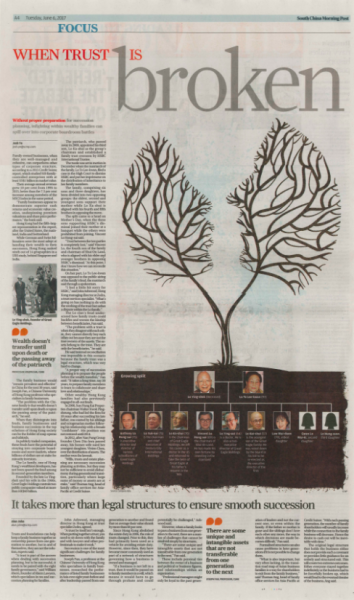Dirty Fighting in Some of Hong Kong’s Wealthiest Families May Undo Value of Kinship

Without proper preparation for succession planning, infighting within wealthy families can spill over into corporate boardroom battles. Prof. Joseph Fan told South China Morning Post that “a proper way of succession planning is to prepare the people before the wealth transfers. It takes a long time, say 20 years, to prepare family members to learn to collaborate and share love and relationships.”
Family-owned businesses, when they are well-managed and cohesive, can outperform other types of corporate structure, according to a 2015 Credit Suisse report, which studied 920 family-controlled enterprises with at least US$1 billion in market value.
Hong Kong had the fifth-largest representation in Credit Suisse’s study, after the United States, mainland China, India and Switzerland.
While German and Swiss billionaires were the most adept at handing their wealth to their successors, Hong Kong ranked ninth out of 14 geographies in a UBS study, behind Singapore and India.
In an interview with South China Morning Post, Joseph Fan, Professor of School of Accountancy and Department of Finance and Co-director of Centre for Economics and Finance at The Chinese University of Hong Kong Business School said that the family business would “remain prevalent and effective” in China for the next 30 years.
“The problem with the Chinese family is that wealth doesn’t transfer until upon death or upon the passing away of the patriarch,” Prof. Fan added.
When they disintegrate into feuds, family businesses and business successions in the top echelons of Hong Kong society can be the fodder of soap operas and tabloids.
In publicly traded companies, these feuds have the potential of straying into corporate boardrooms and move markets, where billions of dollars are at stake for minority investors.
The Lo family, one of Hong Kong’s wealthiest real estate developers, has not been spared the feud among its second-generation members.
“The Lo clan’s feud underscored how family trusts – a popular business succession strategy among Hong Kong’s wealthiest families – could backfire and worsen the kinship between beneficiaries,” Prof. Fan said.
“The problem with a trust is that when they disagree with each other, they cannot directly buy each other out because they are not the true owners of the family assets. The assets belong to the family trust. They are only the beneficiaries,” he added.
Prof. Fan said internal reconciliation was impossible in this scenario because the family trust was a legal structure, which was very hard to change.
“A proper way of succession planning is to prepare the people before the wealth transfers. It takes a long time, say 20 years, to prepare family members to learn to collaborate and share love and relationships,” said Prof. Fan… Read More (PDF)
Please also click the image below to view the print coverage.
Source: South China Morning Post
Date published: 5 June, 2017 / 6 June, 2017


